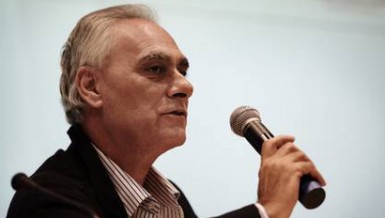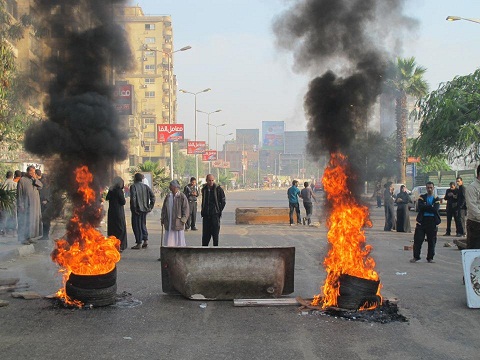
By James M. Dorsey
An Israeli investigation into the murder of 16-year old Mohammed Abu-Khdeir in apparent revenge for the killing of three teenage Israeli settlers on the West Bank has focused attention on Israel’s most militant, racist football fan group.
The focus, irrespective of the group’s involvement in Abu-Khdeir’s death, is likely to end a long-standing refusal by the Israeli government and football association to crack down on anti-Palestinian, anti-Muslim club Beitar Jerusalem FC and its notorious La Familia fan group. The club has long enjoyed the support of Israeli leaders, including Benyamin Netanyahu, and other prominent right-wing personalities.
Media reports said six suspects arrested on Sunday suspected of involvement in Abu-Khdeir’s murder were either members of La Familia, named in honour of the Italian mafia, or met at an anti-Arab La Familia protest. Police were also reportedly investigating a failed kidnapping earlier that week by La Familia associates of a nine-year old Palestinian boy.
La Familia members last week greeted the Beitar squad before police found the three teenagers’ bodies Israel says were kidnapped and murdered by Hamas, with chants saying “here they come, Israel’s most racist team”.
Beitar is the only club to have refused to hire a Palestinian player despite Palestinians being among the country’s foremost performers. Neither the government nor the Israel Football Association has ever taken the club to task on equal opportunity grounds.
Protesters wearing La Familia shirts also demonstrated at the point where the three Israeli teenagers were abducted to demand that settlers randomly attack Palestinians in revenge. The teenagers’ bodies were later found near Hebron, a hot bed of Palestinian nationalism as well as Islamist groups. It is home to a mosque football team that a decade ago produced several suicide bombers.
La Familia briefly sparked national outrage in January 2013 when it unfurled a banner asserting that “Beitar will always remain pure” protesting the club’s hiring of two Muslim players from Chechnya. It was the group’s language, associated with Germany’s National Socialism, that sparked the rare outrage against its consistent racism. The group’s opposition to the Chechens also countered a long-standing pillar of Israeli policy that seeks to forge close ties with its neighbours’ neighbours, in the absence of relations with a majority of Arab and Muslim states.
The group also torched Beitar Jerusalem’s team offices in protest against the hiring of the Chechens. Two Beitar supporters were sentenced to prison as part of a plea bargain where they pleaded guilty to the torching but did not identify themselves as members of La Familia.
The outcry was in stark contrast to the lack of a response to past outbursts by La Familia. These include an attack on Palestinian shoppers and workers in a Jerusalem mall, a Jewish musician who denounced their attitudes in 2012, and Beitar’s refusal to hire Palestinian striker Mohammed Ghadir, who in 2011, volunteered to join the club in a challenge to its anti-Palestinian policy.
Beitar has the worst disciplinary record in Israel’s Premier League. Since 2005 it has faced over 20 hearings and received various punishments, including point deductions, fines and matches behind closed doors because of its fans’ racist behaviour.
The IFA, despite being the only football body in the Middle East to have launched a campaign against racism, has allowed what Israeli football scholar Amir Ben-Porat describes as ‘permissive territory’. In this, “some deviant behaviours are tolerated (such as using profanities) as long as definite rules are followed (that is, no racist chants)”.
Similarly, Jerusalem mayor Nir Barkat, who cultivates an image of tolerance, has largely remained silent about the racism of the team. This is despite, according to Ha’aretz, approximately one third of Barkat’s constituents being 280,000 tax-paying Palestinians.
As a result, La Familia operates in an environment in which racism, racial superiority, bigotry, and little sincere effort to address an issue undermining Israel’ s projection of itself as a democratic state is one predominant story emerging from the country’s football pitches.
Writing in Football & Society, Ben-Porat warned several years ago that “the football stadium has become an arena for protest: political, ethnic, nationalism, etc… ‘Death to the Arabs’ has thus become common chant in football stadiums… Many Israelis consider the Israeli Arabs (Palestinians) to be ‘Conditional Strangers,’ that is temporary citizens… Contrary to conventional expectations, these fans are not unsophisticated rowdies, but middle-class political-ideological right-wingers, whose rejection of Arab football players on their team is based on a definite conception of Israel as a Jewish (Zionist) state.”
Beitar, a reference to the Jews’ last standing fortress in the second century Bar Kochba revolt against the Romans, was established in 1923 in Latvia.
The movement’s Jerusalem branch founded the sports club in 1936, the year of the first Palestinian uprising. Beitar Jerusalem initially drew many of its players and fans from Irgun, an extreme nationalist, para-military Jewish underground. Many of La Familia’s members are supporters of Kach, the outlawed violent and racist party formerly headed by assassinated Rabbi Meir Kahane.
Beitar’s initial anthem reflected the club’s politics, glorifying a “guerrilla army racist and tough, an army that calls itself the supporters of Beitar.” Fans’ support reaches a feverish pitch as they chant racist, anti-Arab songs and denounce the Prophet Mohammed.
Beitar’s hard core fans – Sephardi males of Middle Eastern and North African origin who defined their support as against the country’s Ashkenazi establishment – revelled in their status as Israeli football’s bad boys. Their dislike of Ashkenazi Jews of East European extraction, rooted in resentment against social and economic discrimination, rivals their disdain for Palestinians.
The refusal by the IFA and government to stand up to the group’s blatant racism reflects the ambiguity of a society that long yearned for peace, increasingly grown frustrated at how beyond grasp it seemed to be, and finally concluded that peace no longer was essential to its survival.
As a result, the failure to confront La Familia has entrenched Palestinian perceptions of an Israeli society that is inherently racist. Israeli Palestinian Member of Parliament Ahmed Tibi has laid the blame for La Familia’s excess at the doorstep of Israeli political and sports leaders. “For years, no one really tried to stop them, not the police, not the club, not the attorney-general and not the Israeli Football Association,” he said.
James M. Dorsey is a Senior Fellow at the S. Rajaratnam School of International Studies (RSIS), Nanyang Technological University. He is also co-director of the University of Würzburg’s Institute for Fan Culture, and the author of The Turbulent World of Middle East Soccer blog and a forthcoming book with the same title




